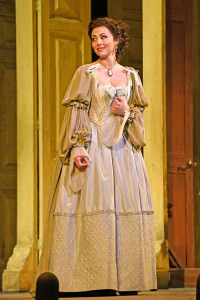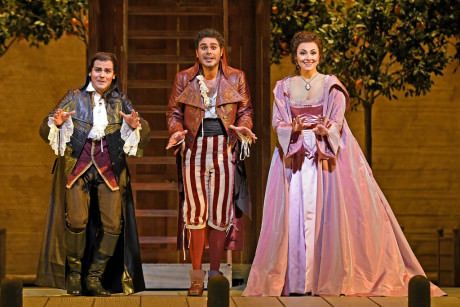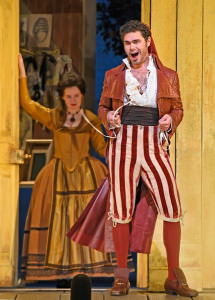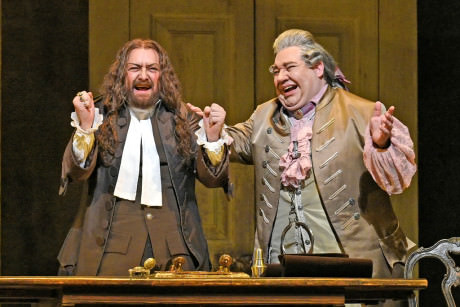The Barber of Seville turns 200 years old in two months. Performing it in English translation works best when it helps show American audiences how similar the elements of effective comedy are across all forms of entertainment, no matter what century we’re in.
The Metropolitan Opera gets most of the way there with the comic goods in a holiday season production that opened Wednesday night in New York. The Met’s production has a young and energetic cast, even in the principal “comic old man” character role. The cast line-up also combines a Washington favorite from her engagements in D.C. with several debuts among singers trained in both the Washington National Opera’s and the Met’s young artist programs.

The production, geared to family audiences, is abridged to 2 hours including the intermission, and in the process even the secondary female character loses her one solo. No matter, for the resulting male-dominated production still revolves around mezzo-soprano Isabel Leonard, who plays Rosina, a stowaway who’s in love with a young man who she thinks is a poor itinerant troubadour.
Ms. Leonard, who starred in the title role of the Washington National Opera’s production of Cinderella earlier this year and who sang Rosina last year at the Met in the full Italian original of Barber, has a knack for a lift of the eyebrow or lean of the body to give her co-stars easy set-ups for comedic business. The force of Rosina’s sly shyness combined with devilish determination to outwit her evil master, Dr. Bartolo, comes out equally well in both languages.
The wonder of The Barber of Seville is that it requires as much in the way of vocal acrobatics as any dramatic or otherworldly bel canto opera, and the step-by-step gradations of Ms. Leonard’s coloratura as Rosina are remarkably even and precise. It’s also a nice lesson for kids who want to sing seriously that not every girl has to call herself a soprano to be a star, even if Ms. Leonard did readily take in a high C at one point (whether interpolated in the score or original to it).
As Ms. Leonard’s love interest, tenor David Portillo shone vocally as Count Almaviva in his Metropolitan Opera debut. Not only does Mr. Portillo have a transparently clear high range, he avoids the jumpy sort of body tic that some tenors demonstrate as they bounce their way up composer Gioachino Rossini’s coloratura lines to get to the money notes.

At the same time, Mr. Portillo could stand to be a little goofier in his character’s various disguises. He’s very credible as “Lindoro,” the penniless singer that Rosina believes he is and who the count “plays” to enchant her with his voice and to test her love interest in him isolated from his actual wealth and status. But as a “soldier” who’s supposed to pretend to be drunk in order to disarm Bartolo’s suspicions when he claims he has orders to be housed in Bartolo’s mansion, Mr. Portillo could have appeared a lot more inebriated once past his entrance.
And he could have made a lot more of his next disguise as a substitute singing instructor who arrives to give Rosina her “lesson.” A really effective Almaviva struggles comically throughout the entire scene to maintain the severe music-teacher façade under the fascination of seeing his beloved Rosina in the same room.
No such difficulties in interpretation were in store for the title character, played by Elliot Madore, a graduate of the Met’s Lindemann Young Artist Development Program. The native of a Toronto suburb is a former hockey player as well as an opera singer, and he was athletically present all over the stage as Figaro, the titular “barber” who will in fact happily perform any cosmetological, dental, veterinary, affair-fixing or influence-peddling service for his clients throughout Seville provided there’s an appropriate fee.
A notable feature of Mr. Madore’s excellent baritone is that his English diction in its middle and higher ranges matches the best of Broadway actors, although the words get a bit chewy in his bottom notes. The nature of the Figaro role does raise the primary issue of performing The Barber of Seville in English in an era where the libretto of every opera is presented in two places – on the stage and in written “titles” (above the stage in most opera venues but on the back of seats at the Met).

Barber is not a leisurely rollout of human emotions like many operas but rather a plot-heavy – indeed plot-happy – explosion of words that at times approaches Gilbert-and Sullivanesque patter-song proportions. Figaro’s show-stopping, ego-boosting Act 1 number, Largo al factotum, or roughly “Make way for the guy who does everything,” is simply funnier-sounding in Italian than with any of the cringe-worthy rhymes English translators try to impose on it. Having the singer perform it in English also paradoxically strips title-writers of flexibility, as now they have to match all of the words rather than approximate the important ones to give the opera-goer “the idea” in their own language as they enjoy the original vocals and the characterization.
Kids who attend the performance will probably be best off not bothering with the seat titles at all and just taking in what they can make of the characters. That’s a point implicitly made by the opera’s conductor, Antony Walker, in my recent interview with him largely about another of his affiliations as artistic director of Washington Concert Opera. Prices for all Met operas – not just Barber – through early January are half-off for those under 18 when accompanied by at least one adult full-price ticket-holder.
As for Mr. Walker, his lively conducting got a good response from the nimble Metropolitan Opera orchestra, which flits from conductor to conductor on a nightly basis and nailed the energy-inducing crescendo passages on Barber’s opening night.
Washingtonians who attend the Met can also take pride in one more character on stage – Valeriano Lanchas as the slimy Dr. Bartolo. The native of Colombia is a graduate of the Washington National Opera’s Domingo-Cafritz Young Artist program and has appeared a number of times on the Kennedy Center Opera House stage.

Mr. Lanchas’ booming bass-baritone, comic manner, and perfect-sounding English came especially to the fore as Dr. Bartolo took a chair at the front of a thrust stage surrounding the orchestra pit and sung miserably of his confusion at being outwitted by the other characters to great effect. Playing a bumbling old man while still under 40 years old himself was a great outlet for what was also Mr. Lanchas’ Metropolitan Opera debut. Let’s hope Mr. Lanchas doesn’t abandon our stages in D.C. now that he’s seen the bright lights of New York.
Running Time: 2 hours with one 20-minute intermission.
The Barber of Seville was performed on Wednesday, December 16, 2015 at 7:30 p.m. at the Metropolitan Opera – 30 Lincoln Center Plaza, in New York, NY. Performances continue on December 19, 21, 24, 26, 29 and 30 and January 1 and 2. Curtain times vary; check the complete schedule here. Ginger Costa-Jackson performs the role of Rosina in place of Isabel Leonard on December 29 and January 1; check the Met’s schedule for other scheduled substitutions.
From the 2012 Metropolitan Opera Production:




